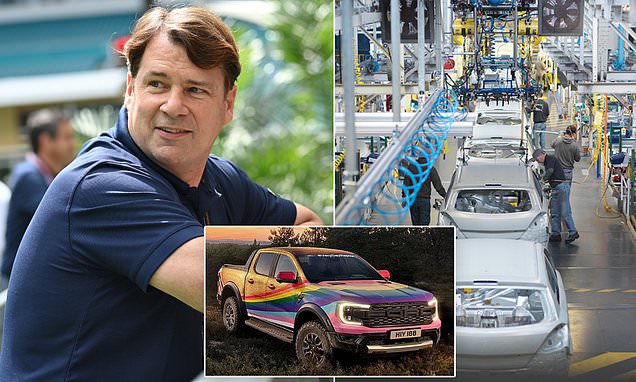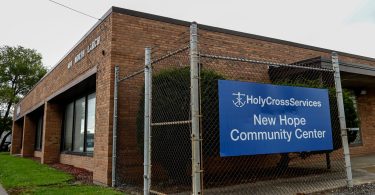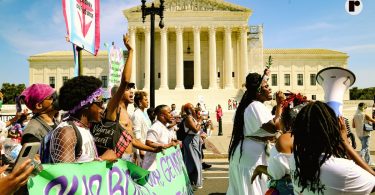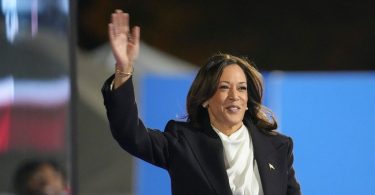Michigan-based vehicle maker Ford says attitudes to DEI are changing fastHarley-Davidson, Tractor Supply, and John Deere have recently ditched DEI READ MORE: Home improvement store Lowe’s scraps LGBTQ Pride events
The automaker Ford has become the latest firm to reverse course on its work with an LGBTQ group and other parts of its ‘inclusivity’ agenda, faced with anger from conservative consumers.
Ford on Wednesday said it will alter its diversity, equity, and inclusion (DEI) efforts, and end participation in a controversial ranking system for LGBTQ-friendly firms.
In recent weeks, Harley-Davidson, Tractor Supply, John Deere, Lowe’s and other firms have scrapped their DEI schemes, which have been targeted by conservative activists.
Advocates of DEI say it gets more women and minorities into workplaces, but critics say it’s a ‘woke‘ box-ticking exercise that ends up denying opportunities to straight, white men.
In a memo to employees, Ford CEO Jim Farley said attitudes to DEI were changing fast.
‘We are mindful that our employees and customers hold a wide range of beliefs,’ Farley said.
‘The external and legal environment related to political and social issues continues to evolve.’
The company would still take care of employees and customers but would steer clear of ‘publicly commenting on the polarizing issues of the day,’ Farley said.
The Dearborn, Michigan-based firm’s employee resource groups, which divide staff along racial, ethnic and other identity-based lines, have changed this past year, he added.
They now focus on networking, mentorship, professional development and community service.
The $273 billion firm will also drop some external culture surveys, including the LGBTQ scorecard of the Human Rights Campaign (HRC), and various ‘best places to work’ lists, he said.
Ford famously faced conservative headwinds last year over its ‘Very Gay Raptor,’ a pickup decked out in rainbow colors that appeared at Pride events.
Robby Starbuck, an anti-DEI activist who has confronted companies over their employment policies, said Ford and others were bowing to pressure from conservatives.
‘This isn’t everything we want, but it’s a great start,’ the 35-year-old Cuban American posted on X.
‘We’re now forcing multi-billion dollar organizations to change their policies.’
Will Hild, director of Consumers’ Research, a conservative campaign group, praised Ford for abandoning a ‘bigoted, divisive ideological fad.’
‘Still, Ford should go further and end all DEI practices,’ Hild told The Mail.
But the HRC’s president Kelley Robinson said Ford was being ‘shortsighted’ by not catering for America’s growing LGBTQ population.
‘Ford Motor Company is abandoning its financial duty to recruit and keep top talent from across the full talent pool,’ said Robinson.
Many companies that embraced DEI policies in the wake of the cop killing of unarmed black man George Floyd in May 2020 have stepped back from them for fear of irking conservative customers.
Some businesses have received public shareholder letters since 2021 saying their DEI schemes amount to illegal discrimination and breach directors’ duties to investors.
Anti-DEI groups were energized by the US Supreme Court ruling in June 2023 that struck down affirmative action in university admissions, a ruling that does not directly affect employers.
Former president Donald Trump, the Republican candidate for US president, has been highly critical of DEI initiatives.
Starbuck, a former music-video producer and Republican candidate for Tennessee, claims credit for prompting several companies to change or scrap their DEI programs.
Unlike legal activists Edward Blum and Stephen Miller’s America First Legal, who’ve filed lawsuits and regulatory complaints alleging DEI programs are discriminatory, Starbuck relies on X to generate popular outrage.
For some, DEI schemes are important and necessary, as they can help to overcome historical racism and sexism and make it easier for people of all backgrounds to get ahead in education and work.
Critics say it’s a form of reverse discrimination that unfairly blows back on straight, white men.
Others say DEI schemes may be well-intentioned, but seldom achieve their desired goals and
that mandatory workshops on ‘micro-aggressions’ and ‘white fragility’ often make things worse by stirring up divisions in offices and classrooms.
An Ipsos poll in April found that 61 percent of voters called DEI a ‘good thing.’
Still, a Gallup survey from around the same time found that only 38 percent of people wanted businesses to be taking a stance on current events — a drop of 10 percentage points from 2022.







